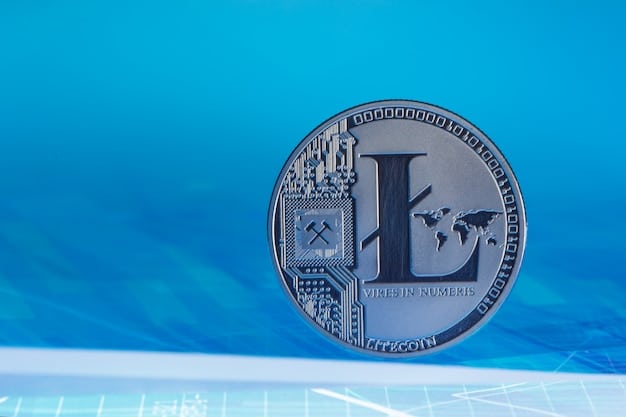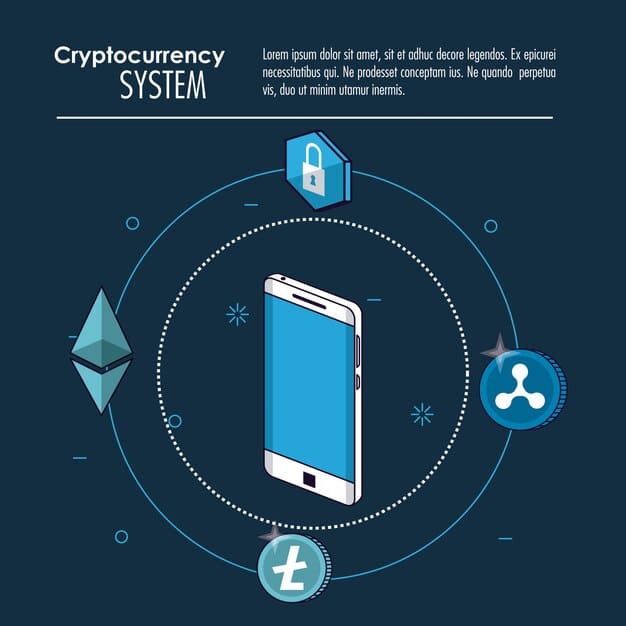Solana SPL Token Standard: Your Guide to Creating & Managing Tokens

Solana’s SPL Token Standard provides a framework for creating and managing tokens on the Solana blockchain, offering high throughput and low transaction costs, making it an attractive option for developers looking to build decentralized applications and digital assets.
Dive into the world of Solana tokens! This guide explores the Solana’s SPL Token Standard: A Guide to Creating and Managing Your Own Tokens with Ease, unlocking possibilities for developers and crypto enthusiasts alike.
Understanding Solana’s SPL Token Standard
The Solana Program Library (SPL) token standard is the protocol governing the creation and management of tokens within the Solana blockchain ecosystem. Solana’s design prioritizes speed and low transaction costs, making the SPL token standard an appealing option for developers. Understanding its features and capabilities is crucial for anyone venturing into tokenization on Solana.
This section explores the core aspects of SPL tokens, comparing them to other token standards and highlighting the distinct advantages offered by Solana’s innovative architecture.
Key Features of SPL Tokens
SPL tokens possess several features that set them apart from tokens on other blockchains. These features contribute to Solana’s high-performance and efficient transaction processing.
- Speed & Scalability: Solana’s architecture provides fast transaction speeds and high throughput, allowing for efficient creation and management of SPL tokens.
- Low Transaction Costs: Lower transaction fees compared to Ethereum make SPL tokens an economical choice for developers.
- Decentralized Exchange (DEX) Integration Compatibility: SPL tokens can be easily integrated with decentralized exchanges, enabling seamless trading.

SPL tokens offer a powerful alternative for applications requiring speed and affordability, offering features tailored to meet the demands of modern blockchain development.
Creating Your Own SPL Token: A Step-by-Step Guide
Creating your own SPL token can seem daunting, but breaking it down into manageable steps simplifies the process. This section provides a comprehensive, step-by-step walkthrough of the token creation process on Solana.
From setting up your environment to deploying the token, we will cover all essential procedures, tools, and coding examples to help developers successfully mint their SPL tokens.
Setting Up Your Development Environment
To begin, ensure your development environment is properly configured. This includes installing necessary tools and libraries that facilitate token creation on Solana.
- Install Node.js and npm: These are essential for running JavaScript-based tools required for SPL token creation.
- Install the Solana Tool Suite: This suite includes the Command Line Interface (CLI) required for program deployment and interaction.
- Configure Solana CLI: Set the CLI to connect to your desired Solana network (devnet, testnet, or mainnet-beta).
With the environment properly set up, the next steps involve creating the token program and initializing the necessary accounts:
Minting Your SPL Token
Once the environment is set up, minting tokens involves specifying the token’s initial supply and defining important attributes.
- Define Token Metadata: Determine the token’s name, symbol, total supply, and decimals.
- Create Mint Account: This account manages the token’s supply and authority.
- Mint Tokens: Transfer tokens into designated accounts, ensuring their distribution.
Token creation involves careful parameter setting and precise execution. Successful token minting is essential for distributing freshly minted tokens into the Solana ecosystem.
By following these steps, you can successfully create your own SPL token and set it up for use within the Solana blockchain.
Managing and Distributing SPL Tokens
Effective token management and distribution are vital for the sustained functionality and usability of SPL tokens. Proper management ensures tokens are accessible and circulated securely within the Solana ecosystem.
This section covers key aspects of managing SPL tokens, from setting up token accounts to executing token transfers, to ensure your token operates flawlessly.
Setting Up Token Accounts
Token acccounts enable the storage and management of SPL tokens for different users. Setting these up correctly is essential for a functional SPL token ecosystem.
- Create Associated Token Accounts: These accounts securely store tokens for specific users.
- Grant Permissions: Properly assign permissions to allow or restrict token transfers and management functions.
Properly setting up token accounts ensures tokens are securely managed, allowing them to be easily accessible for users.
Transferring SPL Tokens
Token transfers are a fundamental aspect of using SPL tokens. Smooth, secure, and cost-effective transfers ensure proper token use.
- Execute Transfers: Use the Solana CLI or a compatible program to transfer tokens between accounts.
- Verify Transactions: Confirm that transactions are completed successfully on the Solana network.

Transferring tokens requires specifying sender/recipient addresses, token amount, and confirmation, ensuring the correct value of tokens is moved within the Solana ecosystem.
Token Account Configuration and Transfer enable efficient management and ensure that tokens are available and function properly for Solana users.
Security Considerations for SPL Tokens
The security of your SPL token is paramount. Addressing vulnerabilities and ensuring the token’s safety requires diligent planning and execution.
This section covers critical security considerations for SPL tokens, providing guidance on how to safeguard your tokens against potential threats and vulnerabilities.
Auditing Smart Contracts
Auditing source code for security vulnerabilities is a fundamental aspect when launching new SPL tokens. Regular auditing reduces the risk of code issues.
- Conduct Regular Audits: Employ reputable auditors to regularly assess your token’s smart contracts for potential vulnerabilities.
- Address Vulnerabilities Promptly: Fix any identified issues to secure the token.
Regular Code Reviews by Third-Party Auditors provide valuable insight on vulnerabilities or defects in the SPL token smart contracts, minimizing risks.
Safeguarding Keys
Protecting private keys is essential. Unauthorized access to these keys can lead to the loss of tokens or unauthorized activities.
- Store Keys Securely: Utilize hardware wallets or multi-signature schemes to secure your keys.
- Regularly Rotate Keys: Change keys periodically to minimize potential compromise risks.
Safeguarding keys is essential, as loss can lead to devastating outcomes for projects and token holders. By following best practices, project teams can minimize potential vulnerabilities.
Proper auditing of smart contracts and safeguarding private keys are important for securing your SPL tokens, ensuring their integrity and long-term operation within the Solana ecosystem.
Use Cases and Applications of SPL Tokens
SPL tokens are versatile and applicable across diverse use cases. Their efficiency and scalability make them highly suitable for numerous decentralized applications.
This section explores real-world applications of SPL tokens, delving into use-cases from decentralized finance (DeFi) to non-fungible tokens (NFTs) and beyond.
Decentralized Finance (DeFi)
SPL tokens play a significant role in DeFi, enabling various financial activities and innovations.
SPL tokens can be used in a diverse range of DeFi applications, like:
- Decentralized Exchanges (DEXs): SPL tokens can facilitate quick and cost-effective trading pairs on DEX platforms.
- Lending and Borrowing Platforms: SPL tokens can manage loan collateral and loan distributions in DeFi lending protocols.
The features provided through SPL tokens can facilitate a quicker and more efficient DeFi ecosystems, enhancing the user experience.
Non-Fungible Tokens (NFTs)
SPL tokens can also be applied in the NFT space, facilitating more efficient token interactions and streamlined governance models.
- NFT Marketplace: Use SPL tokens to manage NFT transactions, payments, and royalties.
- Gamified Assets: Integrate NFTs as in-game assets managed by SPL token infrastructure.
SPL tokens offer unique capabilities for creating, managing, and distributing digital collectibles within the Solana ecosystem.
SPL tokens provide a versatile foundation for an array of applications, bolstering DeFi innovations and NFT interactions within the Solana blockchain world.
The Future of SPL Tokens and the Solana Ecosystem
The future of SPL tokens within the Solana ecosystem is promising. Advancements and continuous development enhance their capabilities and drive adoption.
This section explores emerging trends, developments, and future outlooks for SPL tokens, indicating their potential impact on the Solana blockchain and broader market.
Emerging Trends in SPL Token Development
Several trends indicate the growth and evolution of SPL tokens, revealing opportunities for developers and users alike.
- Expanded DeFi Applications: Continued integration of SPL tokens into more intricate decentralized finance protocols.
- Cross-Chain Compatibility: Efforts to bridge Solana’s SPL tokens with other blockchains, potentially expanding usability.
The growing integration of SPL tokens in DeFi and cross-chain interoperability will foster a broader community and use cases within the Solana ecosystem.
Future Outlook for the Solana Ecosystem
Continued innovation and development on Solana contribute to enhanced performance and overall growth of its ecosystem.
- Protocol Improvements: Continued enhancements to Solana’s network to further increase transaction speeds and lower costs.
- Increased Adoption: Broader adoption of SPL tokens in various industries, enhancing the utility and value.
With ongoing advancements and a continuously growing presence, the Solana ecosystem offers tremendous potential and exciting advancements in the tokenization world.
| Key Point | Brief Description |
|---|---|
| 🚀 SPL Token Standard | Protocol for creating tokens on Solana blockchain. |
| 🛠️ Token Creation | Requires setting up a dev environment and minting tokens. |
| 🔒 Security | Involves contract auditing and key safeguarding. |
| 💰 Use Cases | DeFi, NFTs, and beyond. |
Frequently Asked Questions (FAQ)
▼
The Solana Program Library (SPL) is a collection of on-chain programs that provide core functionalities for the Solana blockchain, including token creation and management via the SPL Token standard.
▼
SPL tokens benefit from Solana’s high transaction speeds and low costs, making them efficient for various applications. They also easily integrate with other Solana-based projects and decentralized exchanges.
▼
Creating an SPL token involves setting up a development environment, using the Solana CLI tools, defining token metadata, and minting the initial token supply. The guide above outlines the process in detail.
▼
SPL tokens can be highly secure if best practices are followed. This includes conducting regular smart contract audits, safeguarding private keys, and adhering to security recommendations from the Solana community.
▼
SPL tokens are used in various applications, including decentralized finance (DeFi) for trading and lending, non-fungible tokens (NFTs) for digital collectibles, and other incentivized community rewards programs.
Conclusion
Solana’s SPL Token Standard provides the tools that developers need to create and manage tokens effectively. Understanding the benefits, security measures, and potential use cases is key for anyone looking to harness the power of tokenization on the Solana blockchain. The future looks bright for SPL tokens as the Solana ecosystem continues to evolve.





